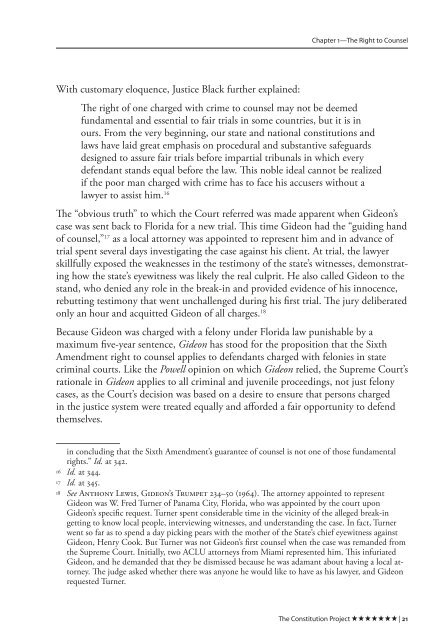Justice DenieD
Justice DenieD
Justice DenieD
Create successful ePaper yourself
Turn your PDF publications into a flip-book with our unique Google optimized e-Paper software.
With customary eloquence, <strong>Justice</strong> Black further explained:<br />
Chapter 1—The Right to Counsel<br />
The right of one charged with crime to counsel may not be deemed<br />
fundamental and essential to fair trials in some countries, but it is in<br />
ours. From the very beginning, our state and national constitutions and<br />
laws have laid great emphasis on procedural and substantive safeguards<br />
designed to assure fair trials before impartial tribunals in which every<br />
defendant stands equal before the law. This noble ideal cannot be realized<br />
if the poor man charged with crime has to face his accusers without a<br />
lawyer to assist him. 16<br />
The “obvious truth” to which the Court referred was made apparent when Gideon’s<br />
case was sent back to Florida for a new trial. This time Gideon had the “guiding hand<br />
of counsel,” 17 as a local attorney was appointed to represent him and in advance of<br />
trial spent several days investigating the case against his client. At trial, the lawyer<br />
skillfully exposed the weaknesses in the testimony of the state’s witnesses, demonstrating<br />
how the state’s eyewitness was likely the real culprit. He also called Gideon to the<br />
stand, who denied any role in the break-in and provided evidence of his innocence,<br />
rebutting testimony that went unchallenged during his first trial. The jury deliberated<br />
only an hour and acquitted Gideon of all charges. 18<br />
Because Gideon was charged with a felony under Florida law punishable by a<br />
maximum five-year sentence, Gideon has stood for the proposition that the Sixth<br />
Amendment right to counsel applies to defendants charged with felonies in state<br />
criminal courts. Like the Powell opinion on which Gideon relied, the Supreme Court’s<br />
rationale in Gideon applies to all criminal and juvenile proceedings, not just felony<br />
cases, as the Court’s decision was based on a desire to ensure that persons charged<br />
in the justice system were treated equally and afforded a fair opportunity to defend<br />
themselves.<br />
in concluding that the Sixth Amendment’s guarantee of counsel is not one of those fundamental<br />
rights.” Id. at 342.<br />
16 Id. at 344.<br />
17 Id. at 345.<br />
18 See Anthony Lewis, Gideon’s Trumpet 234–50 (1964). The attorney appointed to represent<br />
Gideon was W. Fred Turner of Panama City, Florida, who was appointed by the court upon<br />
Gideon’s specific request. Turner spent considerable time in the vicinity of the alleged break-in<br />
getting to know local people, interviewing witnesses, and understanding the case. In fact, Turner<br />
went so far as to spend a day picking pears with the mother of the State’s chief eyewitness against<br />
Gideon, Henry Cook. But Turner was not Gideon’s first counsel when the case was remanded from<br />
the Supreme Court. Initially, two ACLU attorneys from Miami represented him. This infuriated<br />
Gideon, and he demanded that they be dismissed because he was adamant about having a local attorney.<br />
The judge asked whether there was anyone he would like to have as his lawyer, and Gideon<br />
requested Turner.<br />
The Constitution Project | 21


